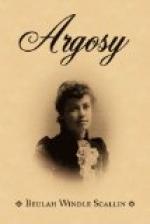Miss Sabina, in her showy drawing-room up at the Manor Farm, thought over the event all day in her own critical way, and predicted evil as the result. There was an old Broadwood grand piano in the room where she sat, covered with a pile of old music—Beethoven, Mendelssohn, Haydn, and all the composers whose music Miss Sabina disliked. This music had belonged to Fred’s mother, a fair and unfortunate creature, whose own story I shall some day write. Miss Sabina’s performances upon the pianoforte were limited to such compositions as the “Canary Birds’ Quadrilles,” “My Heart is Over the Sea,” etc., which she never played at all now. But she looked at the old piano, and recalled her sister-in-law’s pretty baby looks and tragic end, and prophesied evil for Fred. Jacob Hurst laughed the whole business to scorn. The one being in Shenton who could have genuinely rejoiced at Fred’s success knew nothing about it.
Nancy’s thoughts were constantly with him, however, and when her work ended for the day, and she walked homeward across the hills to Braley Brook, she connected many an inanimate object she passed with some look or word of his. These looks and words had always been so kind, so gentle, that as the brook, where the forget-me-nots grew in summer, or the bank in the hollow where the primroses grew thickest in spring, or the fallen tree, which, as the weeks passed, would become golden with moss and lichen again—as all these would awaken to summer sunshine and gladness;—so would her heart. Fred’s love for her—she felt sure he had loved her—was only hidden away like the flowers under the snow, to bloom forth again in spring. It was her winter, that was all, she told herself. She must wait as the flowers did.
When she reached home, her mind was filled with hope—hope which but too soon was to give place to despair. Last night Mrs. Forest had struck her—but then she had not looked nearly so angry as she did now when her daughter appeared before her.
“Where is my ten shillings?” she cried menacingly, as Nancy closed the kitchen-door behind her. “What have you done with it, you ungrateful, unnatural girl?” she repeated loudly.
“Indeed, mother, I know nothing of it,” poor Nancy answered, trembling violently.
“Is it in that there teapot?” inquired the enraged mother, thrusting the article in question close to the frightened girl’s face. Nancy glanced rapidly from the empty teapot to the chimney-piece.
“You needn’t look there, you hussy,” Mrs. Forest continued, seeing the direction Nancy’s eyes were taking. “There’s nothing on the chimney-piece—the money’s gone, and you’ve took it, because your father said you were to—it wasn’t his to give—did he mend the sacks? tell me that! I’ll have my money back—every halfpenny, so you’d better give it me before I make you.”
“Mother, I have not touched it; I know nothing about it, really I don’t,” said Nancy desperately.




